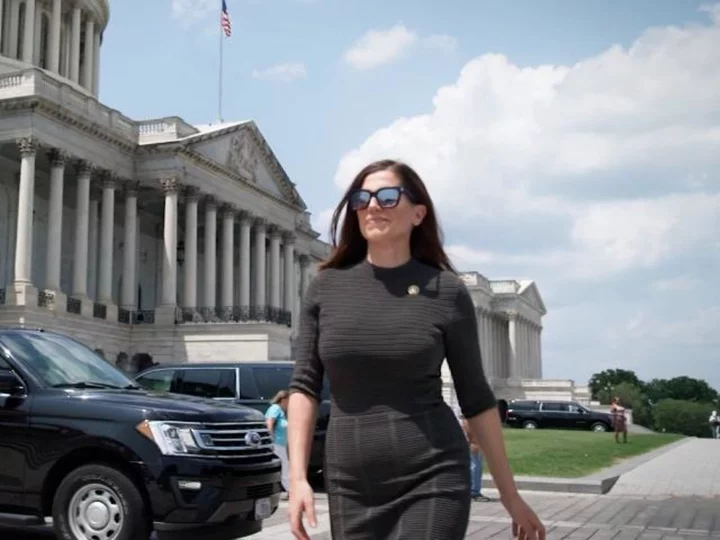
Rep. Nancy Mace says Republicans in swing districts are 'walking the plank' because of abortion restrictions
GOP Rep. Nancy Mace has a warning for her party about some efforts to restrict abortion without exceptions -- and how it could affect moderate House Republicans on whom their narrow majority depends.
2023-09-04 06:54
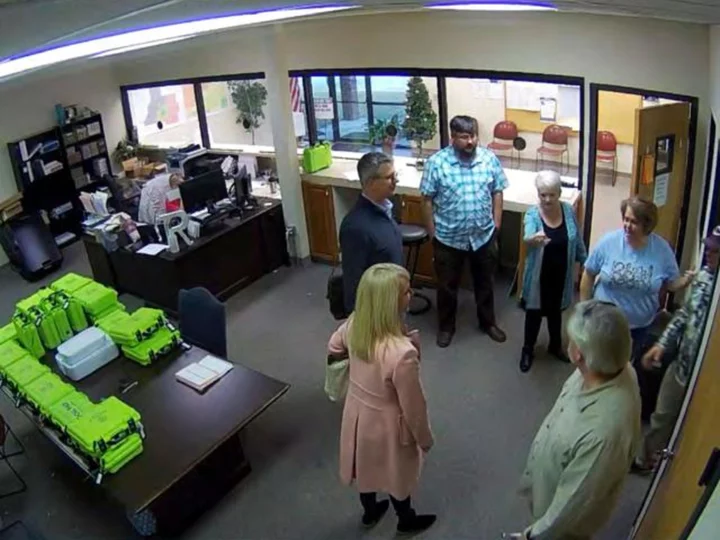
'Crooked Coffee': The alleged election office breach in the Trump indictment was part of a years-long pattern, some locals say
Some residents in Georgia's rural Coffee County say voter intimidation and suppression has always been a part of their lives.
2023-09-02 18:51
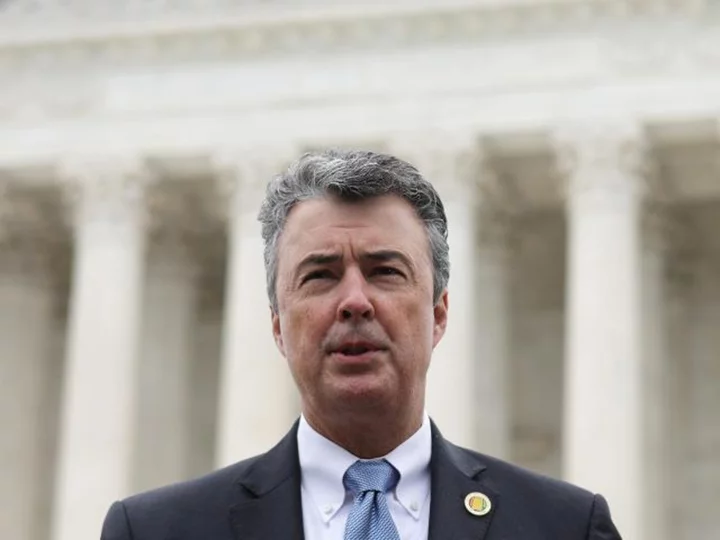
Alabama attorney general says he has right to prosecute people who facilitate travel for out-of-state abortions
Alabama's Republican attorney general said in a court filing that he has the right to prosecute people who make travel arrangements for pregnant women to have out-of-state abortions.
2023-08-31 19:49

US intel: Ukraine war caused 'one of the most disruptive periods' for global food security
Russia's invasion of Ukraine caused deep disruptions in the global food supply, raising prices and increasing the risk of food insecurity in poorer nations in the Middle East and North Africa, America's top spy agency said in an unclassified report released by Congress on Wednesday.
2023-08-31 05:17
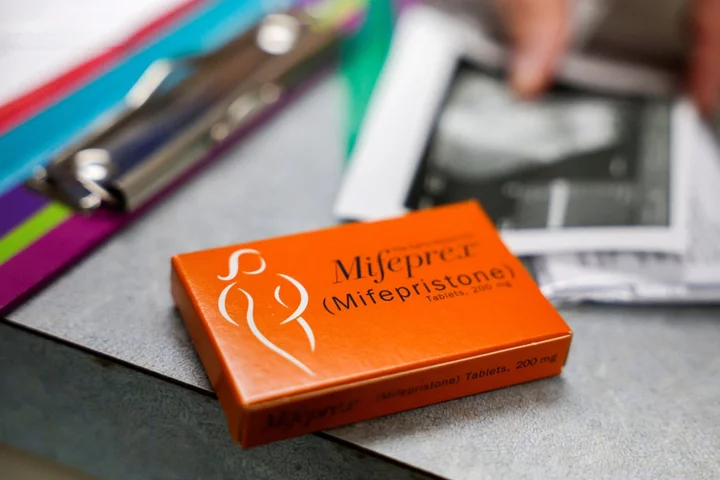
Abortion drug case likely headed to Supreme Court after Republican-appointed judges agree to restrict access
A high-stakes lawsuit over the future of a widely used abortion drug is likely heading to the US Supreme Court, set to determine the fate of abortion rights access across the country for a second time within two years. Three Republican-appointed judges on a federal appeals court have determined that the federal government did not follow proper procedures when it amended regulations for a commonly used medication abortion drug in 2016. But the restrictions will not immediately take effect. The panel partially upheld a ruling from a Donald Trump-appointed federal judge in Texas, whose sweeping decision earlier this year threatened to strip access to the drug altogether. Nothing in the ruling from a three-judge panel on 16 August will go into effect until the nation’s highest court weighs in. Wednesday’s ruling argues that the US Food and Drug Administration unlawfully expanded access to mifepristone, which was first approved by the federal government more than 20 years ago. Mifepristone was first approved by the FDA in 2000 and is approved for use up to 10 weeks of pregnancy. A vast majority of abortions occur within the first nine weeks of pregnancy. From 2019 through 2020, nearly 93 per cent of all abortions were performed before the 13th week, according to the US Centers for Disease Control and Prevention. The drug – part of a two-drug protocol for medication abortions, the most common form of abortion care in the US – is the subject of a lawsuit from a group of anti-abortion activists represented by right-wing Christian legal group Alliance Defending Freedom, which joined efforts to overturn Roe v Wade at the Supreme Court last year. In April, US District Judge Matthew Kacsmaryk – a former right-wing activist lawyer who was appointed to the federal judiciary by Mr Trump – issued a ruling to suspend the FDA’s approval, which was immediately challenged by abortion rights advocates, providers, major medical groups, drug manufacturers and President Joe Biden’s administration. An initial ruling at the US Court of Appeals for the Fifth Circuit blocked part of that decision but struck down policies for mail-in prescriptions and rules that expanded the drug’s approval for pregnancies up to 10 weeks. On 21 April, the Supreme Court blocked the lower courts’ rulings from taking effect while the case plays out, retaining the status quo while the legal case plays out. Following the Supreme Court’s conservative supermajority decision to revoke a constitutional right to abortion care in Dobbs v Jackson Women’s Health Organization, at least 15 states – mostly across the US South – have effectively banned most abortions and imposed criminal penalties against providers. Abortion rights advocates and providers have warned that eliminating or restricting access to mifepristone could drastically impact an already-fragile landscape for abortion care. A ruling that undermines the FDA’s drug approval process could also open the door for other activist-driven legal battles over other drugs wrapped up in political debates, potentially inviting other destabilising lawsuits to Covid-19 vaccines, contraception, HIV medication, gender-affirming care, and other life-saving drugs. Read More What is mifepristone? The widely used pill in the abortion rights battle at the Supreme Court Abortion rights advocates win major victory in Ohio as voters reject GOP plan to thwart ballot measure Texas women detailed agonising pregnancies after being denied abortions. The state blames doctors Some abortion drug restrictions upheld by in a case bound for Supreme Court Akram criticizes Pakistan Cricket Board for leaving Imran Khan out of Independence Day video Netanyahu voices support for Israel's military after his allies and son lambaste security officials
2023-08-17 04:19

Appeals court says abortion pill mifepristone should remain on the market but rules in favor of limiting access
A federal appeals court on Wednesday wiped away a lower court's ruling that would've taken the medication abortion drug mifepristone off the market, but upheld aspects of the ruling that could cut back access to the pills.
2023-08-17 02:55

Janet Yellen admits ‘enjoying’ hallucinogenic mushrooms on China visit
Treasury Secretary Janet Yellen confirmed on Monday that she unwittingly ate a dish containing hallucinogenic mushrooms at a restaurant during a visit to China last month. “So I went with this large group of people and the person who had arranged our dinner did the ordering. There was a delicious mushroom dish,” she said on Monday. “I was not aware that these mushrooms had hallucinogenic properties. I learned that later.” “I … read that if the mushrooms are cooked properly, which I’m sure they were, at this very good restaurant, that they have no impact,” she added. “But all of us enjoyed the mushrooms, the restaurant and none of us felt any ill effects from having eaten them.” During the Treasury official’s visit to China last month, she and her team stopped at a location of Yi Zuo Yi Wang, a restaurant chain specialising in dishes from the Yunnan province, where a food blogger on Weibo spotted the top official eating a variety of Chinese dishes. “When I walked by their table on my way to the washroom, I slowed down to take a glance at the dishes they ordered,” the blogger wrote. That included an order of potentially hallucinogenic jian shou qing mushrooms, a delicacy in Yunnan province. “Our staff said she loved mushrooms very much,” the restaurant wrote on social media. “She ordered four portions of jian shou qing (a Yunnan wild mushroom species). It was an extremely magical day.” The mushrooms are “considered poisonous as they can be hallucinogenic,” Dr Peter Mortimer, a professor at Kunming Institute of Botany who studies the region’s mushrooms, told CNN. “However, scientists have not, as of yet, identified the compounds responsible for causing the hallucinations,”he added. “It remains a bit of a mystery, and most evidence is anecdotal. I have a friend who mistakenly ate them and hallucinated for three days.” Chinese state media quoted diners praising Ms Yellen for her interest in Chinese cuisine and warning about the impacts of the mushrooms. “You thought you were walking straight but you just fell sideways,” one person who had eaten a similar dish told the Xinhua state news agency. The restaurant where the secretary ate was quickly flooded with reservations. "We received a larger number of inquiries about bookings. We are fully booked for Friday and Saturday," a staff member told the state-owned Global Times. Read More Biden signs order barring US investment in Chinese chips, quantum computing and AI sectors Treasury Secretary Janet Yellen reportedly ate hallucinogenic mushrooms at restaurant during China visit China's Xi tells Kissinger that China-US ties are at a crossroads and stability is still possible
2023-08-16 08:17
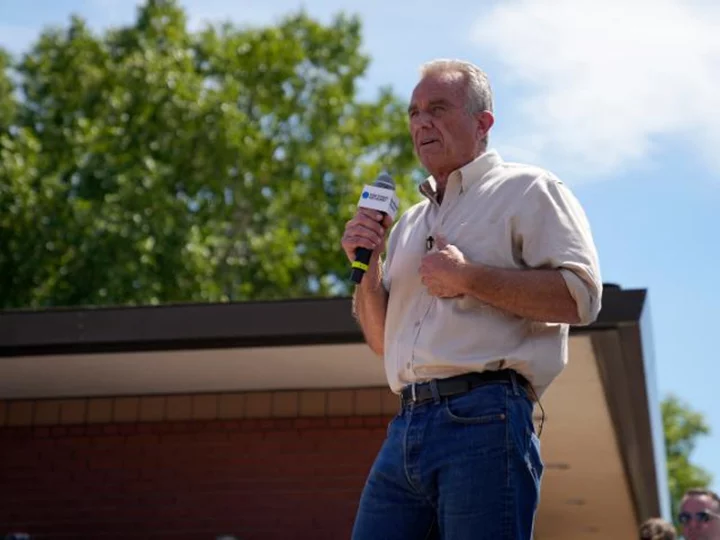
RFK Jr.'s campaign tries to walk back his support of three-month federal abortion ban
Robert F. Kennedy Jr.'s campaign on Sunday evening quickly tried to walk back comments the Democratic presidential candidate had made earlier in the day in support of a nationwide abortion restriction after the first three months of pregnancy.
2023-08-14 11:22
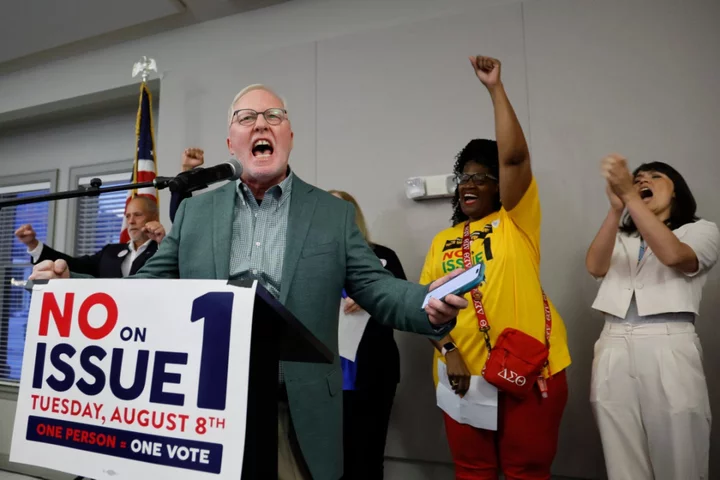
Ohio vote shows enduring power of abortion rights at ballot box, giving Democrats a path in 2024
Abortion wasn't technically on the ballot in Ohio's special election. But the overwhelming defeat of a measure that would have made it tougher to enshrine abortion rights in the state constitution this fall was the latest indicator that the issue remains a powerful force at the ballot box. The election saw heavy turnout for what's typically a sleepy summer election date and sets up another battle in November, when Ohio will be the only state this year to have reproductive rights on the ballot. It also gives hope to Democrats and other abortion rights supporters who say the matter could sway voters their way again in 2024. That's when it could affect races for president, Congress and statewide offices, and when places such as the battleground of Arizona may put abortion questions on their ballots as well. Democrats described the victory in Ohio, a one-time battleground state that has shifted markedly to the right, as a “major warning sign” for the GOP. “Republicans’ deeply unpopular war on women’s rights will cost them district after district, and we will remind voters of their toxic anti-abortion agenda every day until November,” said Aidan Johnson, a spokesperson for the Democratic Congressional Campaign Committee. The measure voters rejected Tuesday, known as Issue 1, would have required ballot questions to pass with 60% of the vote rather than a simple majority. Interest was unusually high, with millions spent on each side and voters casting more than double the number of early in-person and mail ballots ahead of the final day of voting as in a typical primary election. Early turnout was especially heavy in the Democratic-leaning counties surrounding Cleveland, Columbus and Cincinnati. Opposition to the measure, which became a kind of proxy for the November abortion vote, extended even into traditionally Republican areas. In early returns, support for the measure fell far short of Donald Trump’s performance during the 2020 election in nearly every county. The November ballot question will ask voters whether individuals should have the right to make their own reproductive health care decisions, including contraception, abortion, fertility treatment and miscarriage care. Ohio's GOP-led state government in 2019 approved a ban on abortion after cardiac activity is detected — around six weeks, before many women know they are pregnant — but the ban was not enforced because of the U.S. Supreme Court ruling in Roe v. Wade, which granted a federal right to the procedure. When a new conservative majority on the high court last year overturned the nearly 50-year-old ruling, sending authority over the procedure back to the states, Ohio's ban briefly went into effect. But a state court put the ban on hold again while a challenge alleging it violates the state constitution plays out. During the time the ban was in place, an Indiana doctor came forward to say she had performed an abortion on a 10-year-old rape victim from Ohio who could not legally have the procedure in her home state. The account became a national flashpoint in the debate over abortion rights and underscored the stakes in Ohio. Ohio is one of about half of U.S. states where citizens may bypass the Legislature and put ballot questions directly to voters, making it an option that supporters of reproductive rights have increasingly turned to since Roe v. Wade fell. After abortion rights supporters said they hoped to ask voters in November to enshrine the right in the state constitution, Ohio Republicans put Issue 1 on Tuesday’s ballot. In addition to raising the threshold to pass a measure, it would have required signatures to be collected in all 88 counties, rather than 44. The 60% threshold was no accident, abortion rights supporters say, and was aimed directly at defeating the Ohio abortion measure. Since Roe v. Wade was overturned, six states have had elections regarding reproductive rights. In every election — including in conservative states like Kansas — voters have supported abortion rights. In Kansas, 59% voted to preserve abortion rights protections, while in Michigan 57% favored an amendment that put protections in the state constitution. Last year, 59% of Ohio voters said abortion should generally be legal, according to AP VoteCast, a broad survey of the electorate. Last month, a poll by the Associated Press-NORC Center for Public Affairs Research found the majority of U.S. adults want abortion to be legal at least through the initial stages of pregnancy. The poll found that opinions on abortion remain complex, with most people believing abortion should be allowed in some circumstances and not in others. Opponents of the Ohio abortion question ran ads that suggested the measure could strip parents of their ability to make decisions about their child’s health care or to even be notified about it. Amy Natoce, spokesperson for the anti-abortion campaign Protect Women Ohio, called the ballot measure a “dangerous anti-parent amendment.” Several legal experts have said there is no language in the amendment supporting the ads’ claims. Peter Range, CEO of Ohio Right to Life, said he has been traveling across Ohio talking to people and “I’ve never seen the grassroots from the pro-life side more fired up to go and defend and protect the pre-born.” While the November question pertains strictly to Ohio, access to abortion there is pivotal to access across the Midwest, said Alison Dreith, director of strategic partnership for the abortion fund Midwest Access Coalition. Nine Midwestern states — Indiana, Iowa, Kansas, Ohio, Nebraska, Missouri, North Dakota, South Dakota and Wisconsin — are considered restrictive, very restrictive or most restrictive of abortion rights by the Guttmacher Institute, a research and policy organization that supports legal access to abortion. “Ohio in particular has always been a destination state for the states around it,” Dreith said. “If we don’t protect abortion access in Ohio, the options just continue to shrink for people seeking care in the Midwest.” Sri Thakkilapati, the executive director of the Cleveland-based nonprofit abortion clinic Preterm, said the effect of the Ohio vote will reverberate throughout the country. “When we restrict access in one state, other states have to take up that patient load,” she said. “That leads to longer wait times, more travel, higher costs for patients." Thakkilapati called the energy around abortion rights in last year's midterms “exciting.” But she said the media attention died down, and people quickly forgot “how tenuous abortion access is right now.” The special election and ballot measure in Ohio are “a reminder of what’s at stake," Thakkilapati said. “Other states are watching how this plays out in Ohio, and it may give anti-abortion groups in other states another strategy to threaten abortion rights elsewhere,” she said. “And for the majority who do want abortion access in their states but are seeing it threatened, the results in November could give them hope that the democratic process may give them relief.” Kimberly Inez McGuire, the executive director of Unite for Reproductive and Gender Equity, which focuses on young people of color under age 30, says the results of elections involving reproductive rights show that support doesn't come just from Democrats or in cities and states considered liberal bastions. “There was this idea that we couldn’t win on abortion in red states and that idea has really been smashed,” McGuire said. So, too, she said, is the “mythology” that people in the South and Midwest won't support abortion rights. “I think 2024 is going to be huge,” she said. “And I think in many ways, Ohio is a proving ground, an early fight in the lead up to 2024.” Dreith said that since abortion hasn't been on a major ballot since last year, the Ohio vote this fall is “a good reminder” for the rest of the country. “Abortion is always on the ballot — if not literally but figuratively through the politicians we elect to serve us,” she said. "It’s also a reminder that this issue isn’t going away.” Read More Ukraine war’s heaviest fight rages in east - follow live Charity boss speaks out over ‘traumatic’ encounter with royal aide Why Ohio's Issue 1 proposal failed, and how the AP called the race Ohio voters reject GOP plan to thwart upcoming abortion rights proposal Abortion rights advocates push for 2024 ballot initiative in Arizona
2023-08-09 23:50
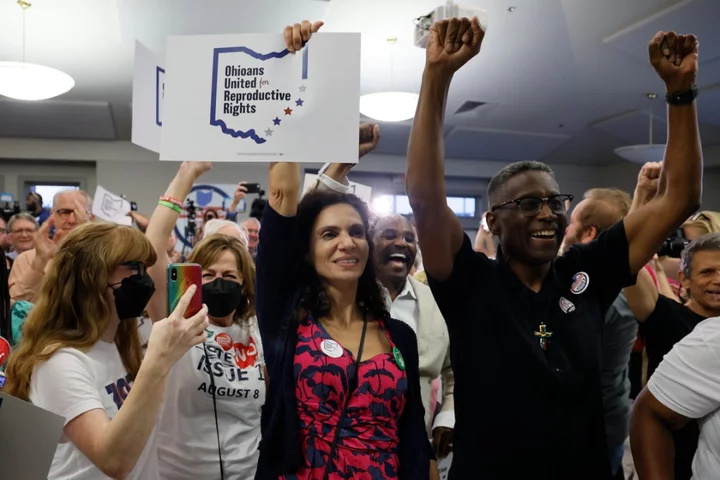
Abortion rights advocates win major victory in Ohio as voters reject GOP plan to thwart ballot measure
Ohio voters have resoundingly rejected a measure that would make it more difficult to amend the state’s constitution, a proposal that Republican officials bluntly admitted was an effort to kneecap an upcoming ballot measure asking voters to enshrine a right to abortion care. That proposal has failed, with roughly 65 per cent of the vote tallied by Tuesday night after polls had closed, according to projections from the Associated Press. Issue 1 would have required that proposed amendments to the state constitution receive at least 60 per cent of the vote, raising the threshold substantially from a current simple majority vote. It also would have increased the minimum number of petition signatures that groups would have to collect before qualifying an issue to get on a ballot. The proposal’s failure means that a November referendum on abortion rights will need only 50 per cent of the vote to enshrine those protections into the state’s constitution, a major victory for abortion rights advocates and democratic campaigns in the aftermath of the US Supreme Court’s decision to strike down Roe v Wade. President Joe Biden called the measure a “blatant attempt to weaken voters’ voices and further erode the freedom of women to make their own health care decisions.” “Ohioans spoke loud and clear, and tonight democracy won,” he said in a statement. Within the last year, voters have also turned out in record numbers to protect abortion rights in California, Kansas, Michigan and Vermont, underscoring the overwhelming unpopularity of the Supreme Court’s decision and the volatile landscape for reproductive healthcare in its wake, while scrambling anti-abortion campaigns from Republican officials emboldened by the ruling. Issue 1 campaign Protect Our Constitution was largely supported by GOP mega-donor and Illinois businessman Richard Uihlein. A coalition of abortion right, civil rights and democratic advocacy groups joined a No On Issue 1 campaign. “Tonight was a major victory for democracy in Ohio,” the group said in a statement following projections of the measure’s defeat. “The majority still rules in Ohio, and the people’s power has been preserved – because Ohio voters showed up and overwhelmingly voted down Issue 1.” Ohio voters saw the proposal for “what it was: a deceptive power grab designed to silence their voices and diminish their voting power,” the group added. Kelly Hall, executive director of the Fairness Project, said the results mark an “incredibly profound and inspiring day for democracy”. “When faced with the choice of whether to allow politicians and special interests to consolidate power and strip voters of their rights, Ohioans fought back,” she said in a statement. “The defeat of Issue 1 should send a clear message to other extremist officials around the country that democracy will not die; people are ready to defend their rights against blatant attacks like Issue 1.” The upcoming proposal for a constitutional amendment in November will ask Ohio voters whether “every individual has a right to make and carry out one’s reproductive decisions.” After the Supreme Court’s ruling in Dobbs v Jackson Women’s Health Organization last June, Ohio lawmakers swiftly outlawed most abortion after roughly six weeks of pregnancy, a law that is currently suspended by a state court injunction but could be reinstated by the state Supreme Court. A vote to enshrine abortion rights in the state’s constitution would effectively overrule any such law. Abortion rights advocates and providers have warned that Ohio’s ban, which does not include exceptions for pregnancies from rape or incest, ignited a healthcare crisis that endangered patients and their families across the state, forcing people to seek care hundreds of miles out of state and navigate complicated legal and medical minefields while experiencing pregnancy complications. Ohio Republicans initially canceled August elections altogether, which have historically low turnout. But in May, they reversed that decision to put Issue 1 on the ballot – a decision that appears to have backfired for them. Nearly 600,000 Ohio voters cast their ballots early, with voters reporting busy polling locations across the state on election day. Read More Texas judge sides with women after harrowing testimony over anti-abortion law DeSantis won’t rule out national abortion ban but suggests there’s no ‘mileage’ left in Congress
2023-08-09 11:28

DeSantis won’t rule out national abortion ban but suggests there’s no ‘mileage’ left in Congress
Ron DeSantis has not ruled out enacting a national abortion “ban” if elected president, after the Florida governor implemented state restrictions on abortion access at 15 weeks and six weeks of pregnancy within the last two years. But he suggested that there is no “consensus” in the US for members of Congress to implement a national ban, as abortion restrictions and the US Supreme Court’s decision to overturn Roe v Wade remain overwhelmingly unpopular. Asked by NBC’s Dasha Burns whether he would “veto any sort of federal bill” that would institute a nationwide ban, Mr DeSantis replied: “We will be a pro-life president and we will support pro-life policies.” In the wake of the Supreme Court’s decision to revoke a constitutional right to abortion care last year, Republican officials have repeatedly stated that the ruling merely left it up to individual states to decide. But anti-abortion lawmakers at the state level and in Congress continue to push for national restrictions that would also strike down state laws that protect and expand abortion access. Congressional Republicans have already passed several anti-abortion measures with national implications and have signalled the GOP’s readiness to ban abortion at certain gestational limits. President Joe Biden has promised to veto any such legislation, if it made it through Congress. In media appearances throughout his campaign, the governor has not directly answered whether he would support or veto legislation that would enact national abortion restrictions, suggesting that the issue should come from the “bottom up” with individual states determining policy. His statements have drawn criticism from influential anti-abortion group Susan B Anthony Pro-Life America, which called the governor’s position “unacceptable” to anti-abortion voters. Meanwhile, his campaign’s top donor has threatened to stop funding the candidate over his “extreme” position on abortion. And Donald Trump, who has taken credit for the Supreme Court’s decision in Dobbs v Jackson Women’s Health Organization, has suggested that his rival for the 2024 Republican nomination for president has gone too far with a state law that bans abortion at six weeks of pregnancy, signed into law just one year after a 15-week limit was put in place. “Dobbs returned it to the political branches. I think the reality is that that basically means the states are going to have primary control over it,” Mr DeSantis told NBC. “You know, I do think the federal government would have an interest in, say, preventing post-birth abortions or things that are really horrific, but I don’t think that there’s enough consensus in the country to see a lot of mileage in Congress,” he added. There is no such thing as a “post-birth” abortion; killing an infant after birth is illegal in all states, and pregnancies resulting in the death of the fetus in the third trimester are exceedingly rare, and largely involve fetal anomalies and life-threatening medical emergencies. The vast majority of abortions take place within the first trimester, while roughly 1 per cent occur after 21 weeks, according to the US Centers for Disease Control and Prevention. The governor also suggested that Democratic officials support “infanticide”, echoing his remarks in a recent CNN interview claiming that “liberal state” allow “post-birth” abortion. “I would not allow what a lot of the left wants to do, which is to override pro-life protections throughout the country all the way up really to the moment of birth in some instances, which I think is infanticide,” he told NBC News. Ms Burns interrupted Mr DeSantis: “That’s a misrepresentation of what’s happening.” The governor also said that he does not support penalties for people who seek abortions. “Not at all,” he told Ms Burns. “No, I don’t think this is an issue about the woman. I think a lot of these women, you know, are in very difficult circumstances. They don’t get any support from a lot of the fathers. And a lot of them, the number one reason why women choose to have an abortion is because they’re not getting support and they feel abandoned. Now, in Florida we’ve provided support and we’ve put our money where our mouth is, but at the end of the day, you know, I would not support any penalties on a woman.” Mr DeSantis also told NBC that he does not support limits on contraception access. “And I think it should be available over-the-counter, and I think people should be able to have access to it,” he added. Read More Texas judge sides with women after harrowing testimony over anti-abortion law Alabama health care providers sue over threat of prosecution for abortion help ‘Walmart Melania’, ‘America’s Karen’ or ‘Tacky Onassis’: Why Casey DeSantis matters to the 2024 race Senator who once worked at a Planned Parenthood warns that Republicans are planning a national abortion ban
2023-08-08 00:47
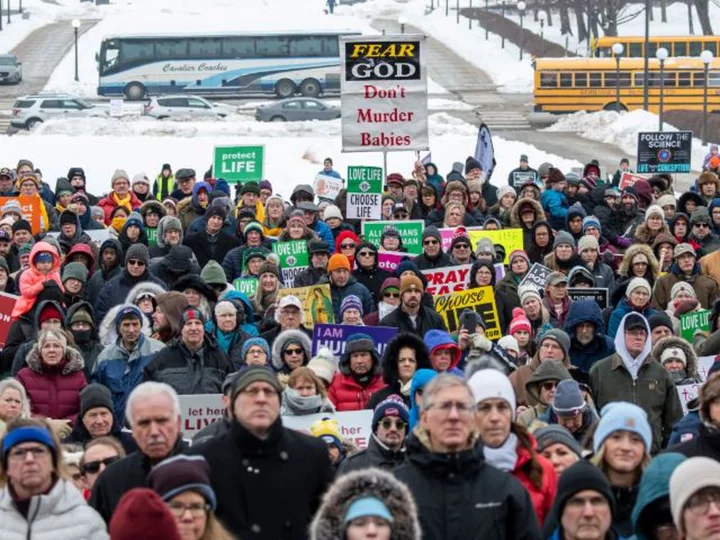
The anti-abortion movement is fractured over what it wants from its first post-Roe GOP presidential nominee
Bernie Hayes has spent most Mondays since the overturning of Roe v. Wade meeting with friends outside of an Iowa Planned Parenthood trying to stop abortions one at a time. He huddles monthly with other like-minded activists plotting more wholesale paths to halting the procedure.
2023-08-07 04:28
